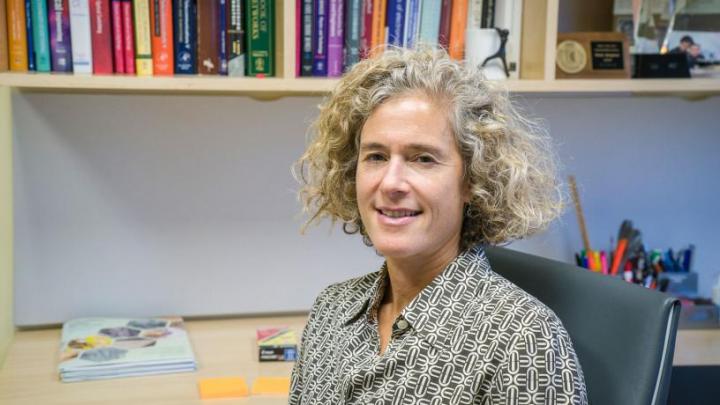Grant supports the development of a new class of on-chip optical interconnects that scale performance without increasing energy costs

Credit: Barbara Alper/Columbia Engineering
Grant supports the development of a new class of on-chip optical interconnects that scale performance without increasing energy costs.
Computing systems today, from embedded networks to high performance supercomputers, increasingly run the risk of being overwhelmed by their off-chip communications. That’s because even as technological advances have exponentially accelerated high performance computation on-chip, off-chip bottlenecks have emerged over electronic interconnects to other processors, memory, and accelerators. The resulting massive uptick in energy consumption is causing chips to hit their maximum power and temperature usage–the so-called “power wall”–that’s become a major obstacle to increased performance overall.
A team led by Keren Bergman, Charles Batchelor Professor of Electrical Engineering, has won a $4.8M, 3.5 year grant from DARPA to create a new class of optical interconnects integrated directly on-chip that are capable of “feeding” and “extracting” ultra-high communications bandwidths from the computer chips to anywhere in the system with extreme energy efficiencies. These photonic interconnects will enable a new generation of systems to scale performance without increasing energy costs. Bergman is working with Columbia Engineering Professors Michal Lipson and Alex Gaeta, together with collaborators from Cornell and JASR Systems, to develop on-chip integrated photonic devices for interconnects that consume 100 times less energy than today’s communication systems while delivering 100 times more communication bandwidths between computing nodes.
“The challenges of opening up this bottleneck in computing systems are especially difficult for the growing data analytics applications in AI and machine learning,” says Bergman, who, as director of Columbia’s Lightwave Research Laboratory, leads multiple research programs on optical interconnection networks for advanced computing systems, data centers, optical switching, and nanophotonic networks-on-chip for embedded systems.
“The movement of communication data is controlled by high energy costs and limited ‘chip-escape’ bandwidth densities, and is, we believe, the singular roadblock to the scalability of these systems,” Bergman added. “We expect our work will break the boundaries on the available communications capabilities of computing today and create a deeply embedded optical connectivity that could revolutionize the computing systems of tomorrow.”
For the project–“Embedded Photonics ultra-bandwidth dense optical interconnect (EmPho)”–the team is developing on-chip integrated photonic interconnects with extreme bandwidth densities per unit area that can scale to deliver petabit-per-second “chip escape” communications while minimizing energy consumption to 100 femtoJoules/bit. The work builds upon the team’s innovative comb frequency laser sources, electronic/photonic dense integration, and a new generation of silicon photonics that is resilient in the face of thermal and fabrication variations.
Bergman’s project is part of the new DARPA PIPES program (Photonics in the Package for Extreme Scalability) that seeks to enable future system scalability by developing high-bandwidth optical signaling technologies for digital microelectronics. Working across three technical areas, PIPES aims to develop and embed integrated optical transceiver capabilities into cutting-edge MCMs and create advanced optical packaging and switching technologies to address the data movement demands of highly parallel systems. The efficient, high-bandwidth, package-level photonic signaling developed through PIPES will be important to a number of emerging applications for both the commercial and defense sectors.
###
Media Contact
Holly Evarts
[email protected]
Original Source
https:/




